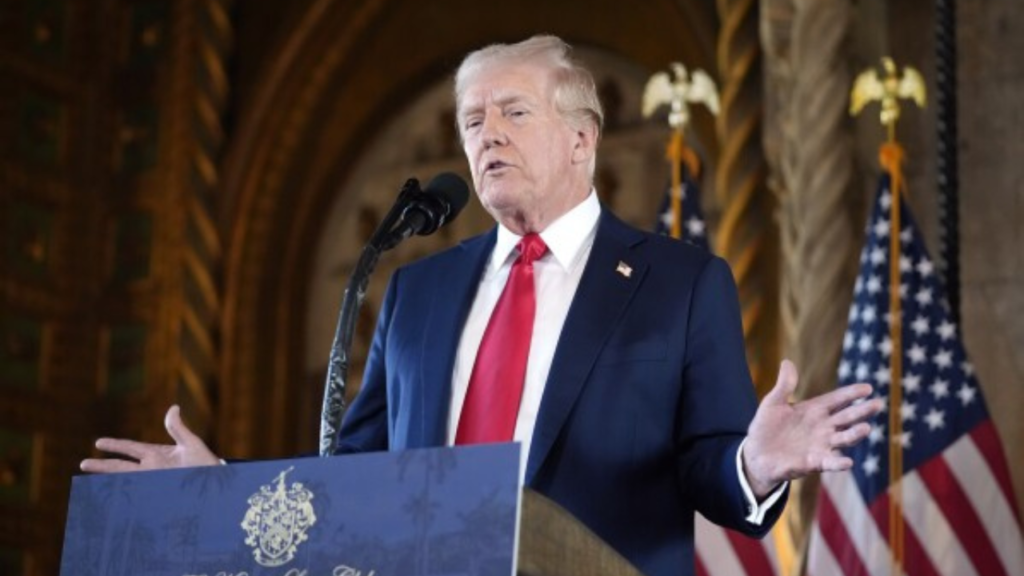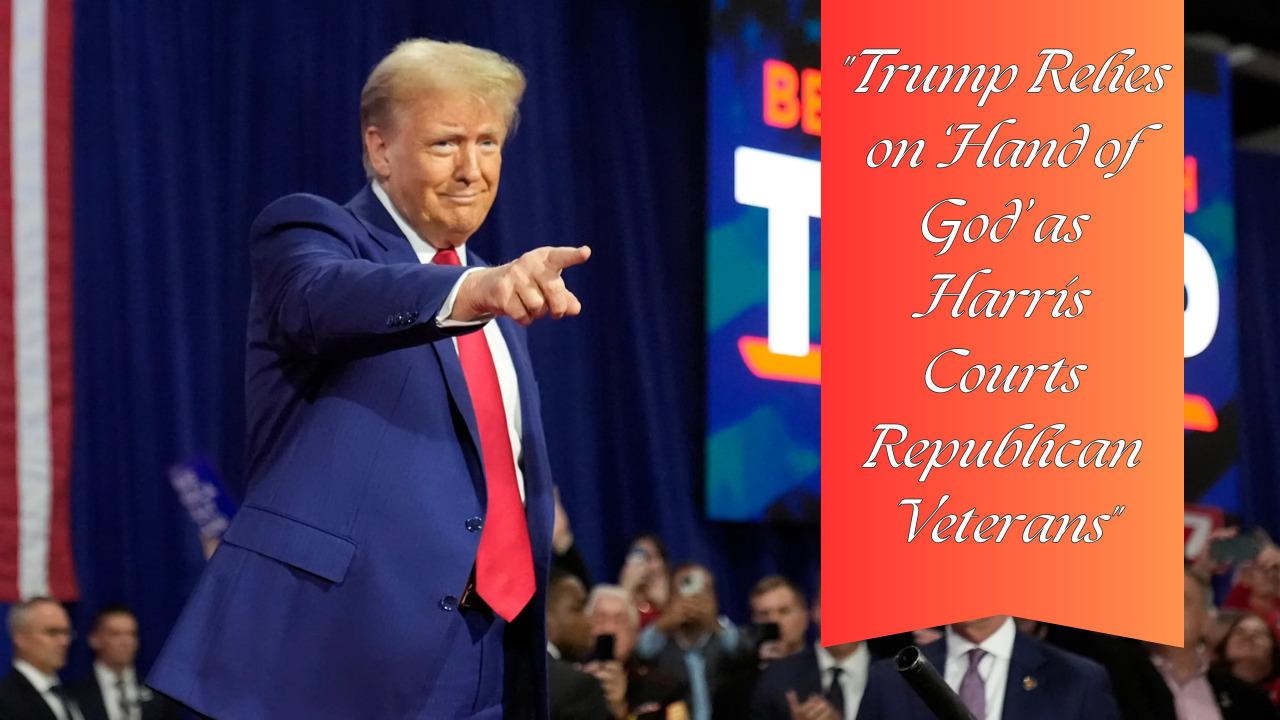Both aisles of politics heat up ahead of the 2024 presidential election. Donald Trump is still the Republican front-runner who has made statements recently that said he was depending on the “hand of God” to guide his campaign and put him back into the White House.
On the other hand, Vice President Kamala Harris is on a campaign drive to win over a considerable percentage of Republican veterans. Generally speaking, this voting population has been proud supporters of conservative principles.
The dynamic that sets Trump’s reliance on supernatural intervention apart from Harris’ pragmatic play of wooing disenchanted Republican veterans is a total departure from the political landscape. In this piece, we’ll look at how these methods are unfolding, what they represent for the approaching election, and how they may affect the Republican base, particularly veterans.
Trump’s ‘Hand of God’ Strategy
Donald Trump has long been a divisive figure, with evangelical Christians and conservative conservatives sharing his views on immigration, law enforcement, and economic reform. What has been most striking this election cycle, though, is the degree to which Trump has invoked religious rhetoric-to say nothing of dubbing himself favored by Providence and thus suggesting that divine intervention will be crucial to his success.

At a recent rally, Trump told his supporters, “Only God can stop us,” reifying his conviction that his campaign is being carried along by hands more than human. This emotion is more than simply political rhetoric; it reflects a larger plan to rally religious conservatives who see Trump as a guy appointed by God to defend American ideals.
This strategy appeals to Trump on both tactical and emotional grounds. With many voters doubting his ability to lead following several court fights and indictments, invoking God allows him to create a story that transcends politics. He is more than just a political candidate; he believes he is on a divine mission to “Make America Great Again.”
The Power of Religious Voters
Historically, religious people, particularly evangelical Christians, have been critical to Republican triumphs. Trump won 76% of the white evangelical vote in the 2020 election, and he is eager to keep that support. The “hand of God” language is well aligned with the principles of this group, insuring their loyalty to his cause.
Trump’s strategy relies heavily on such voters’ beliefs about religion and destiny. To him, most of them in this constituency interlink politics and religion; he illustrates himself as a divinely chosen person to be the only one who could save the country from its perceived moral decay.
This is an age where trust in institutions is at a low point and polarize much in politics, and it is to this space that Trump’s words of guidance through the divine appeal directly to those individuals who feel disenfranchised or ‘marginalized’ by mainstream political narratives. Even as the steady barrage of intensified legal battles besieges him, it is his bedfellow with the Religious Right that provides a sense of cohesion and direction to his supporters.
Kamala Harris’s Focus on Republican Veterans
While Trump focuses on religious rhetoric, Kamala Harris is trying a very different strategy: addressing Republican veterans who may be questioning their allegiance. Veterans have historically been a crucial vote demographic for the Republican Party, but recent developments indicate that not all are pleased with Trump’s leadership or his attitude to veterans concerns.
Harris, the pragmatic politician has been doing some quiet building behind the scenes to support these people. Her message will be very simple: she has valued their contribution, understands their worries and feels they deserve better leadership.
Much of the outreach done with Harris revolves around issues in health care, support for mental health, and employment opportunities. Veterans, particularly those returning from recent conflicts in the Middle East, have experienced quite a few challenges reintegrating into civilian life.
Harris’ agenda emphasizes how a Biden-Harris government has already made achievements in enhancing veteran services and plans to do even more if re-elected.
Why Republican Veterans are in Play
Republican veterans, in particular, have traditionally stuck to the party since it supports strong national security policies, defense spending, and patriotism. Still, some veterans feel disgruntled by Trump’s leadership. Some members of his administration were publicly criticized for how they managed military affairs, including veterans’ healthcare support networks.
For example, some veterans argue that the speech and conduct of Trump during his presidency at times did not deserve honor, honesty, and respect that they hold in great esteem. This chapter focuses on the public ranting between Trump and army commanders as well as various condescending remarks about the captured foes.

Harris has benefited from this disillusionment. She sets herself up as a workable alternative at this moment by addressing their concerns and issues as quickly as possible. Many veterans vote not only based on party loyalty, but whose candidate they believe would be best to serve their interests and uphold the values for which they were fighting.
The Appeal of Kamala Harris’s Military Focus
Harris is far-sighted for the needs of veterans, not just in legislation, but respect. She goes out of her way to attend veterans’ activities, listens to their issues, and makes them heard. This is exactly opposite to the bombastic attitude that is Trump, and gives the veterans a new kind of leadership.
Her work with veterans also contributes to a larger effort to reach out to moderate Republicans who may be dissatisfied with the direction of their party under Trump. In this regard, veterans serve as a bridge to a bigger part of the Republican base that may be open to contemplating Democratic candidates.
Harris hopes that by paying attention to these voters, he can chip away at Trump’s strength in the veteran vote and be enough across battleground states.
Implications for the 2024 Election
Divergent methods of Donald Trump and Kamala Harris: These highlight the changing character of American politics. Thus, whereas Trump used the “hand of God” metaphor to win the votes of religious people, his emphasis on a narrow, highly motivated voter base thus underlines reliance on such a nucleus.
The Harris focus, however, on the Republicans in the war-generation veterans instead shows her effort to seek diversity for the Democratic coalition by reaching out to those who, in the past, supported the GOP. These two tactics are expected to characterize much of the 2024 election, particularly as both candidates strive to galvanize their respective supporters.
The difficulty for Trump will be to preserve his hold on religious conservatives while navigating his legal issues and defending his record. The big challenge Harris faces is convincing Republican veterans who, having previously been affiliated with the GOP, now believe that she is the stronger candidate.
The Role of Swing States and Veterans
Pennsylvania, Michigan, and Florida are some of the known swing states which are heavily populated by veterans. Even slight changes in veteran support could be critical to deciding the outcome in those states. If she can win enough veterans over to vote for her, she may squeak through in any number of close races.

He is aware of this and has begun to mention his record on veterans’ issues in his campaign pitch. Trump again focuses on the betterment of Veterans Affairs that are evolved under his rule and reminds the electors about his achievement in maintaining military power and national security.
Conclusion
Kamala Harris is targeting more pragmatic and focused ways by attempting to court republican veterans toward her, which will ensure her return to the White House whereas Trump is merely relying on the “hand of God”. Both techniques reflect the shifting political dynamics in the United States, as well as the importance of important voting blocs in the impending election.
Ultimately, the success of these techniques will be determined by how successfully each candidate can connect with their unique audiences. Will Trump’s religious appeal be enough to keep his base strong, or will Harris’ outreach to veterans erode his support? Only time will tell as the race for the president in 2024 unfolds.
FAQs:
Why is Trump relying on the ‘hand of God’ in his 2024 campaign?
Trump is using religious rhetoric in an appeal to his evangelical base and positioning himself, in the minds of voters, as a candidate who is guided by divine intervention to lead the country.
How is Kamala Harris courting Republican veterans?
Harris is focusing on the veterans issues of healthcare and jobs, hoping to target disillusioned Republican veterans who may feel alienated by Trump’s leadership.
What role do evangelical Christians play in Trump’s campaign?
Evangelical Christians form a key part of Trump’s base, and his religious messaging aims to keep them energized and loyal for the 2024 election.
What voting bloc is Trump focusing on with his religious messaging?
Trump’s “hand of God” rhetoric is primarily aimed at evangelical Christians, a core part of his conservative support base.

